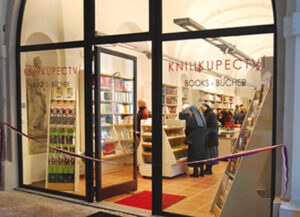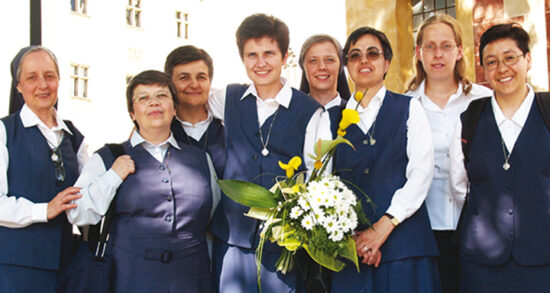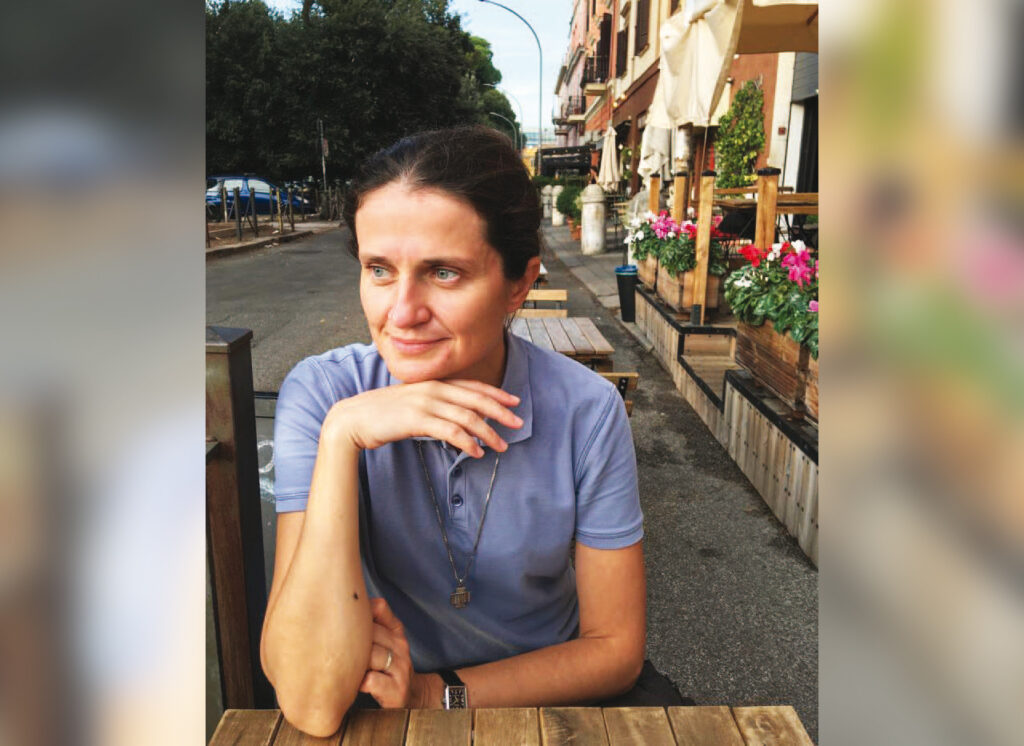I come from Slovakia, a country in which not even a single community of the whole Pauline Family is present. The years of my childhood were spent in the shadow of the five-pointed red star, the symbol of the communist regime, which controlled Czechoslovakia until 1989.
Despite the all-pervasive atheist ideology, my parents continued to practice the Catholic Faith, even if it meant giving up one’s career, above all for my mother. It was she who held in her hands the reins of giving a Christian formation to me and my two older brothers. In addition to Sundays, she would often take us to Mass on weekdays as well. I have to admit, however, that when I was small, my mother’s invitation to “seek first the kingdom of heaven” did not arouse great zeal in me, although I never had the courage to contradict her.
When I was in elementary and middle school, my family befriended a community of nuns in our area. They lived in an old castle near my town under the watchful eye of the communist regime, and my father helped the community with some maintenance work. Whenever we went to visit the nuns, I enjoyed playing in their big garden with my two brothers. With somewhat less enthusiasm, I allowed them to involve me in conversations about Jesus, prayer, etc.–subjects I viewed as “girl stuff.”
Instead, I found it much more appealing to push a heavy wheelbarrow filled with weeds from the garden. It was a chance to imitate my big brothers! But in spite of my rather down-to-earth preferences, I could see shining on the faces of those nuns the unmistakable joy springing from a life dedicated completely to God. This attraction–at first very vague–began to nestle more and more deeply in my soul to the point that gradually a concrete desire began to take shape. “I’d like to live like that!” I thought to myself. There was nothing heroic about my day-to-day life. After the fall of the communist regime, the only situation I had to face “heroically” was that I was not considered “cool” by the girls and boys I knew. At this point, I was now spending a lot of time in church even without my mother’s urging, and my interest in the things of faith and religion certainly did not increase my popularity among my peers.
I was a good student and my convictions earned me a certain amount of respect from everyone, but I was something of a non-conformist. In the 1990’s there was a notable flowering of religious initiatives in my zone and the nuns I knew began to organize school camps for girls. I can clearly remember participating in one of them with the specific intention of getting to know first-hand a way of life that, perhaps one day in the future, could also be mine….
But instead of savoring, as I had hoped, the “heavenly atmosphere” of a life consecrated to God, I experienced an almost suffocating fear. After four terrible days, I returned home with great relief and said to myself forcefully: “Well, I’ll never do that again!” However, despite the trauma of that camp school experience, my inexplicable attraction to a life dedicated to God did not fade. During my high school years, I got to know nuns from different religious Congregations and I participated in their initiatives for young people. On each of those occasions, the bitter taste of my first experience recurred. For some reason, I continued to feel suffocated in religious communities, which led me to tell myself with even greater conviction, “The religious life is not for me!”
 The inexplicable tension between a certain attraction to consecrated life and the feeling of being suffocated in the environments in which it was lived lasted until my last year of high school. I was preparing for my final exams and trying to decide what university to enroll in when I read an article in our Catholic weekly about the Daughters of St. Paul, who had opened a community several years earlier in Prague, the capital of the Czech Republic. The photos showed the nuns surrounded by bookshelves. As I read the text describing the charism of the Pauline Sisters, the thought immediately crossed my mind: “Maybe this is something I could do….”
The inexplicable tension between a certain attraction to consecrated life and the feeling of being suffocated in the environments in which it was lived lasted until my last year of high school. I was preparing for my final exams and trying to decide what university to enroll in when I read an article in our Catholic weekly about the Daughters of St. Paul, who had opened a community several years earlier in Prague, the capital of the Czech Republic. The photos showed the nuns surrounded by bookshelves. As I read the text describing the charism of the Pauline Sisters, the thought immediately crossed my mind: “Maybe this is something I could do….”
A rather hesitant exchange of letters ensued between myself and the sisters. The advice of the FSPs of Prague to avoid rushing into things and to continue my studies serenely made it sound like they were not very interested in me. But I was grateful for their advice and acted on it. The opportunity to visit them for the first time came about a year later. I was in my first year at the university and although I was legally an adult, my parents would permit me to make the overnight bus trip to Prague only if my mother went along with me. She justified her insistence on taking part in the adventure by saying she wanted to relive her memories of the city in which she herself had studied. On my part, I viewed this parental attitude as a compromise that I was willing to make in order to resolve a matter that gave me no peace.
Our visit was a very quick one: a nightlong bus trip to Prague, a day with the sisters, and then another nightlong bus trip home. In Prague, we were welcomed by Sr. Rosanna and Sr. Isi.
At that time, the sisters’ knowledge of the Czech language was at beginner’s level and my knowledge of Italian was zero so my mother’s presence was providential. Thanks to her profession as a speech therapist, she was able to keep the table conversation flowing in spite of its linguistic hiccups. But what made talking with the nuns awkward for me was more than just the diversity of languages.
I was literally baffled! Those foreign sisters did not fit into any of my ideas about religious life. There was nothing glamorous about their appearance. They lived in a very ordinary apartment in the center of town and their modest bookstore, still in the process of being set up, did not look like a fascinating apostolic work. Yet, the closed-in, trapped feeling that had characterized my previous experiences in various convents did not manifest itself.

Naturally, the restoration of my mental peace after two all-night bus trips did not take place immediately. However, after a few months I returned to Prague to spend about a week with the sisters. Several aspects of their life seemed unusual to me, yet a little interior voice whispered cautiously: “I think I could feel at home here…. I think I could give my life to God here.” In the years that followed, I returned several more times to spend a few days of my school vacations with the sisters. Finally, the autumn after my graduation, I returned to Prague to stay.
Anna Matikova, fsp

